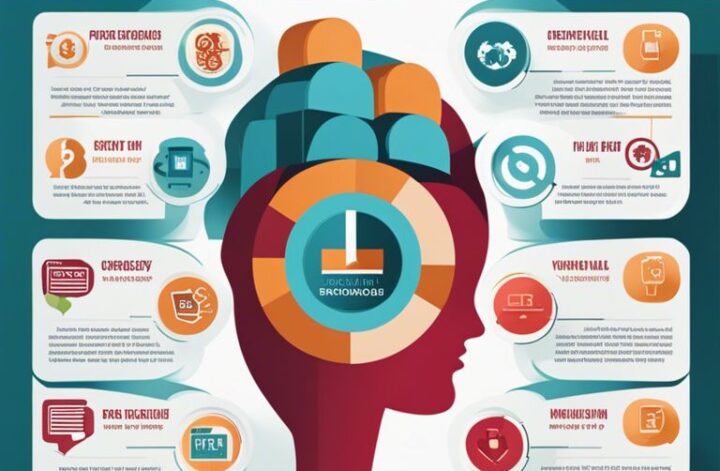You may often hear that money can’t buy happiness, but the reality is that the relationship between money and happiness is much more complex than a simple cliché. The way we manage our finances and our mindset around money can significantly impact our overall well-being. In this article, we will probe into the intricate connection between money and happiness, exploring how a balanced financial mindset can contribute to a happier and more fulfilling life.
The Psychology of Money and Happiness
Emotional Well-Being and Financial Security
While it is commonly believed that money can buy happiness, the reality is much more nuanced. Studies have shown that there is a correlation between financial security and emotional well-being. For individuals who struggle to make ends meet, the constant stress of financial uncertainty can take a toll on their mental health and overall happiness. Conversely, having a stable income and savings can provide a sense of security and peace of mind, contributing to a higher level of emotional well-being.
The Hedonic Treadmill: Understanding the Temporary Boost
Emotional satisfaction derived from material possessions or wealth is often short-lived. This phenomenon, known as the hedonic treadmill, suggests that individuals quickly adapt to new levels of income or material wealth, leading to a temporary boost in happiness that fades over time. Despite experiencing an initial surge in happiness from a raise or a purchase, individuals tend to revert to their baseline level of happiness shortly thereafter.
Psychology plays a crucial role in understanding the complex relationship between money and happiness. Research has shown that individuals who prioritize experiences and relationships over material possessions tend to report higher levels of overall well-being. By shifting focus away from the acquisition of material wealth and towards meaningful experiences and connections, individuals can cultivate a more sustainable source of happiness.
The Threshold Effect
Some studies suggest that there is a certain threshold of income beyond which more money no longer directly equates to more happiness. This threshold varies depending on individual circumstances and regional cost of living. However, the concept remains consistent – once basic needs are met, the impact of increased income on overall well-being diminishes.
Identifying the Satiation Point
Satiation refers to the point at which an individual’s income surpasses their vital needs, leading to a decrease in the incremental effect of additional wealth on happiness. Understanding this satiation point is crucial for achieving a balanced financial mindset, where pursuing monetary gains beyond this threshold may not yield significant increases in overall well-being.
Beyond the Threshold: When More Money Stops Equating to More Happiness
Threshold effects on happiness have been documented across various income levels and demographics, showing that once basic needs are met, the pursuit of wealth for the sake of increasing happiness may be futile. It is vital to recognize the diminishing returns of money on happiness and redirect focus towards non-monetary sources of fulfillment and well-being.

Money Management and Mental Health
Not to be underestimated, the way we handle our finances can have a significant impact on our mental well-being. Research shows that there is a complex relationship between money and happiness, with studies indicating that a certain threshold of wealth can contribute to overall life satisfaction. For more insights on this topic, check out What is the relationship between money and happiness.
Budgeting for Happiness: Allocating Funds to What Matters
Money management involves more than just making ends meet; it’s about prioritizing spending in a way that aligns with your values and goals. By budgeting for happiness, individuals can ensure that their financial resources are allocated to activities and purchases that bring genuine joy and fulfillment. This intentional approach to money can lead to a sense of control and satisfaction, ultimately contributing to overall well-being.
The Stress of Debt: Managing Finances to Avoid Negative Emotional Impact
Managing debt is a critical aspect of financial well-being, as the burden of owing money can take a toll on mental health. According to studies, a high level of debt is associated with increased stress, anxiety, and even depression. To avoid the negative emotional impact of debt, individuals should prioritize strategies for debt management, such as creating a repayment plan, seeking financial counseling, and making conscious efforts to reduce debt over time. By taking control of their financial situation, individuals can alleviate the stress and emotional strain that often comes with debt.
Societal Perspectives on Money and Fulfillment
Cultural Attitudes Toward Wealth and Success
An individual’s cultural background plays a significant role in shaping their attitudes toward money and success. In some societies, wealth and material possessions are seen as symbols of status and success, leading people to prioritize financial gain as a measure of fulfillment. On the other hand, cultures that value community, relationships, and spiritual growth may place less emphasis on material wealth and more on intangible aspects of life.
Social Comparison: Wealth and the Perception of Well-being
Engaging in social comparison can also influence how individuals perceive their own well-being in relation to others. In a society where conspicuous consumption is prevalent, individuals may feel pressure to keep up with societal standards of wealth and success, leading to feelings of inadequacy or insufficiency. This constant comparison can hinder one’s ability to find true happiness and contentment, as the focus shifts from intrinsic values to external validation.
Success
| Cultural Attitudes Toward Wealth and Success | Social Comparison: Wealth and the Perception of Well-being |
| An individual’s cultural background shapes attitudes toward money and success. | Social comparison influences perceptions of well-being in relation to others. |
A balanced financial mindset is necessary in navigating societal pressures and cultural norms related to money and success. By understanding the impact of cultural attitudes and social comparison on one’s overall well-being, individuals can cultivate a sense of fulfillment that goes beyond monetary wealth.

Money’s Role in Life’s Key Areas
Now, to understand the intricate relationship between money and happiness, we must explore how financial well-being impacts various aspects of our lives. In a recent study published in Unraveling The Money-Happiness Myth: Insights From Yale’s Science of Well-Being Course, researchers examined into the ways in which money influences our overall well-being.
Relationships and Financial Harmony
Harmony in relationships is often closely intertwined with financial well-being. Money can either be a source of conflict or a tool for shared goals and experiences. When financial concerns are managed effectively within a partnership, it can lead to a stronger foundation and deeper connection. The ability to communicate openly about finances and work together towards common financial objectives can strengthen bonds and foster harmony in relationships.
Health, Lifestyle, and the Ability to Afford Self-Care
Lifestyle choices and access to healthcare are significantly influenced by financial stability. It is vital to have the means to afford nutritious food, regular exercise, and medical care for optimal health. Financial security also allows individuals to invest in self-care practices, such as meditation retreats, spa treatments, or fitness classes, which can contribute to overall well-being. Research has shown that individuals with higher incomes tend to have better physical health and longer life expectancies compared to those with lower incomes.
It is crucial to prioritize self-care and prioritize health, both physically and mentally, to ensure a balanced and fulfilling life.
Education and Personal Development Opportunities
Opportunities for education and personal development are often directly tied to financial resources. Higher education, vocational training, and skill-building programs can open doors to new career prospects and personal growth. Investing in education not only enhances one’s knowledge and skills but also increases earning potential and access to better job opportunities. Financial stability provides the freedom to pursue lifelong learning and personal development goals, contributing to a sense of fulfillment and purpose in life.
Education is a powerful tool that empowers individuals to achieve their full potential and make a positive impact in their communities and beyond. The ability to access quality education and personal development opportunities can significantly enhance overall well-being and happiness.
As a final point, a balanced financial mindset plays a crucial role in shaping our well-being across various life domains. By understanding the impact of money on key areas such as relationships, health, lifestyle, education, and personal development, individuals can strive for greater harmony and fulfillment in their lives.

Finding Balance: The Intersection of Wealth and Joy
The Art of Contentment: Simple Living and Mindful Spending
To truly find happiness in the intersection of wealth and joy, one must master the art of contentment. This involves embracing simple living and practicing mindful spending. By focusing on what truly brings us joy and fulfillment, we can minimize the urge to chase material possessions and instead prioritize experiences and relationships.
Philanthropy and Generosity: The Joy of Giving Back
Philanthropy and generosity play a crucial role in the relationship between money and happiness. Research shows that giving back not only benefits the recipient but also enhances the giver’s well-being. By contributing to causes we are passionate about and helping those in need, we can experience a sense of purpose and fulfillment that goes beyond material wealth.
This commitment to philanthropy can take many forms, from volunteering time and skills to donating money to charitable organizations. Regardless of the method chosen, the act of giving back can have a profound impact on one’s overall well-being and sense of happiness.
Strategies for Enhancing Happiness with Financial Means
Investing in Experiences Over Possessions
Over the years, research has consistently shown that investing in experiences rather than material possessions leads to greater happiness and fulfillment. According to a study published in the Journal of Positive Psychology, experiences like travel, dining out, or attending events create lasting memories and a sense of shared connection, unlike the fleeting satisfaction derived from purchasing material goods.
Financial Planning for Long-Term Satisfaction
With proper financial planning, individuals can pave the way for long-term satisfaction and peace of mind. By setting clear financial goals, creating a budget, and prioritizing savings, individuals can alleviate money-related stress and build a foundation for future financial security. For instance, a survey conducted by the American Psychological Association found that 72% of adults who feel very confident in their ability to reach their financial goals report feeling significant less stress related to money compared to those who are less confident.

Final Words
Considering all points discussed, it is evident that there is a complex interplay between money and happiness. While financial stability is undeniably important for overall well-being, it is equally crucial to maintain a balanced mindset towards money. Striking a harmonious relationship with finances involves understanding that money is a tool for achieving goals and not an end in itself. Cultivating a healthy attitude towards wealth can lead to greater contentment and satisfaction in life.
In summarization, the key to unlocking the connection between money and happiness lies in finding a balance that allows for financial security while prioritizing intangible aspects of well-being. By nurturing a mindful approach to money management and recognizing the intrinsic value of experiences and relationships over material possessions, individuals can experience a deeper sense of fulfillment and contentment. Ultimately, achieving a balanced financial mindset is vital in promoting overall happiness and enhancing the quality of life.
FAQ
Q: How does money influence happiness?
A: Money can influence happiness by providing a sense of security, freedom, and the ability to access resources that contribute to overall well-being. However, research shows that beyond a certain income threshold, the correlation between money and happiness diminishes.
Q: How can a balanced financial mindset contribute to happiness?
A: A balanced financial mindset involves understanding the value of money, setting realistic financial goals, and practicing mindful spending and saving habits. By maintaining a healthy relationship with money and avoiding excessive materialism, individuals can experience greater peace of mind and satisfaction with their financial situation.
Q: What are some tips for achieving financial well-being and happiness?
A: Some tips for achieving financial well-being and happiness include creating a budget, saving for the future, investing wisely, avoiding unnecessary debt, and focusing on experiences and relationships rather than material possessions. It’s necessary to prioritize financial stability while also recognizing the importance of non-material factors in overall happiness.




